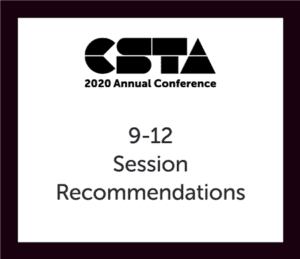
These CSTA 2020 recommendations are just for you, 9-12 educators!

Full Story
We released the CSTA 2020 Virtual Conference schedule today and there are many sessions available for you as a 9-12 CS educator. To help you get started in planning your schedule for the virtual event, we’ve provided recommendations relevant to you!
Git and Github: How to Use It, How to Teach It and How it Can Support Your Work as a Teacher
Understanding version control and collaborative coding are important skills for aspiring computer science students. Additionally, teachers can leverage Git and GitHub to assist with information tracking and student assessment. Many teachers and students, however, find Git intimidating. In this workshop, Mike Zamansky, JonAlf Dyrland-Weaver, and members of the GitHub education team will teach the attendees how to use Git and GitHub while going through a sequence that gently introduces the tools and concepts to the teacher’s classes. At the same time, we will look at how GitHub can enhance the learning process. Teachers will leave the workshop with a working knowledge of Git and GitHub and a series of steps to bring that same knowledge to their students.
Programming Art to Learn Math
Computer science, mathematics, and art can be combined for powerful learning. This session will introduce participants to the free web-based Bricklayer system, which has been used with students from elementary school through college (supported by NSF Grant #1712080) to teach computer science and mathematics. Bricklayer supports block- and text-based programming, and the outcome of programs is art: pictures and even 3D printable objects. Participants will receive training on the tool and approach, examples of course materials, and the opportunity to brainstorm ways to creatively inspire students with computational and mathematical thinking. No prior experience required.
Group Work That Works: Agile for Authentic Learning
Once thought of as “just programming,” computer science has grown to encompass a variety of roles and disciplines. Isn’t it time that the CS classroom evolved to meet the demands of the 21st-century workplace? Through true project-based learning, students build product backlogs, complete sprints, and hold stand-up meetings and retrospectives to give them skills that mirror those used in software development. Further, students effectively collaborate, communicate, and create, giving meaning to lessons and bringing their programming to life. Led by a Certified ScrumMaster, participants in this workshop will learn how to teach and implement agile methodology in their classrooms and schools to effectively prepare students for the computing career landscape they’re destined to enter. Participants will leave with lesson plans and resources for implementation in the CS classroom, core subject areas, and a school staff setting.
AP CSP 2020: Updated Course and Exam
Since the launch of the AP Computer Science Principles course in 2016, we’ve been gathering feedback on its structure and content from K-12 and higher education professionals, industry partners, and curriculum and professional development providers. This is part of our standard process of strengthening all AP courses. Based on what we’ve heard, we’re making updates to the AP CSP course and exam, starting in the 2020-21 school year, to improve the course experience and better align AP CSP to introductory college courses in the subject. In this session, participants will be provided with a deep dive into the new AP CSP Course and Exam Description binder, as well as the new assessment components. The session will advise participants in how they can use these materials, along with provider curriculum, to structure units that align to newly-created formative topic questions.
Gender-Equitable and Culturally Relevant Teaching and Learning in CS
The gender gap in computer science classrooms will continue to persist until we can create the support needed for all girls to develop positive STEM identities. While there is abundant research on this problem, educators need specific strategies to put it into practice in their classrooms. Since 2010, the SciGirls Strategies have been used by over 3,000 educators in STEM and CS classrooms. After two years of reviewing research, writing, and evaluating, the updated SciGirls Strategies are available. The SciGirls Strategies provide specific plans for engaging girls in STEM, with detailed tips that are easy for even beginning educators to implement in their classrooms. The SciGirls Strategies are built on a framework of creating a STEM-for-all learning environment and adopting culturally responsive practices.
The fundamental strategies are:
- Connect STEM experiences to girls’ lives;
- Support girls as they investigate questions and solve problems using STEM practices;
- Empower girls to embrace struggle, overcome challenges, and increase self-confidence in STEM;
- Encourage girls to identify and challenge STEM stereotypes;
- Emphasize that STEM is collaborative, social, and community-oriented;
- Provide opportunities for girls to interact with and learn from diverse STEM role models.
SciGirls is an Emmy Award-winning program on PBS Kids. Participants will be briefly introduced to the video resources available as part of the newest season of SciGirls, which covers computational thinking concepts and important CS topics such as big data, physical computing, and animation. This session will introduce attendees to the new SciGirls Strategies and include discussion of how attendees can apply each of the strategies to their programs. Participants will see firsthand how the SciGirls Strategies are implemented by trying out several new SciGirls computer science-related activities. Participants will leave the session with a copy of the strategies and the inspiration to develop new gender-equitable and culturally responsive CS education programs.
We cannot wait to connect with you during these sessions and more during CSTA 2020! If you haven’t yet registered, head over to the CSTA 2020 website, and secure your spot!

